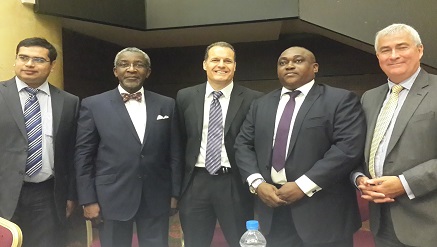E-Financial
Phillips Consulting Inks Partnership with Polaris FT

Phillips Consulting Limited, a business and management consulting company that draws its competitive strength from collaborations with global partnership, has announced recorded another strategic partnership with Polaris Financial Technology (FT) Limited.
The leading African based business and management consulting practitioners defined the partnership as to include a co-marketing of Polaris FT products and services, with exclusive sales distribution across Africa.
Speaking to Nigeria CommunicationsWeek at Phillips Consulting Breakfast Forum and Web Jurist Award v12.0, Mr. Foluso Phillips, the chairman, described Polaris FT Limited, as a leader in financial solutions for the global financial services industry, adding that the partnership will enable Phillips Consulting to provide the African market with all of its renowned cutting edge services.
Phillips Consulting focuses on creating and managing change in organisations by helping them formulate and implement customer focused strategies, align their management systems to support service delivery, and develop the competence and capabilities of their people to deliver on their promises.
He said the partnership will offer a solid platform which interacts with the mission of Phillips Consulting to contribute visibly in bringing Africa into the forefront of the global economy by devising strategies, designing systems and developing people to significantly improve performance.
He added that through the measures to be adopted under the partnership, Phillips/Polaris will be forging strategic alliances in Africa, expanding the best of Africa into the rest of the world and taking the best of the world into Africa.
Phillips added that, “Phillips Consulting is proud to join forces with Polaris FT to offer a wide range of financial technology services to the African market that can be fully integrated into any existing solutions in use by any organization.
“The uniqueness of the range of services offered by Polaris stemmed from its ability to integrate with major financial platform already running in any organization”.
He maintained that the multifaceted partnership will allow them expand its addressable markets by providing customers with integrated solutions that increase the efficiency of their IT infrastructure.
On his part, Christopher Tomes, senior vice president, iGTB Africa of Polaris FT, told Nigeria CommunicationsWeek that they were excited to have entered into partnership with the reputable firm.
According to him, Phillips Consulting was sighted by Polaris as capable of leading their course in penetrating African market with their world best solutions.
He said that the Polaris FT has a deep understanding of the lifecycle of money and the role of technology as a value creator, hence the partnership for Africa.
Founded in 1993, Polaris Financial Technology Limited is a global leader in Financial Technology (FT) for Banking, Insurance and other Financial Services.
The organization offers superior technology solutions through its two specialized divisions that enable clients unprecedented operational efficiency – FT Services and FT Products.
The organization’s specialist capability, from solutioning through delivery, is apparent in its full spectrum offerings across Testing, Infrastructure Management, Business Efficiency, Business Transformation, Data & Analytics, Mobility & Channels, and Risk & Compliance.
E-Financial
Nigeria to Exit Grey List Soon – SEC

Nigeria may soon exit the Financial Action Task Force (FATF) grey list, Emomotimi Agama, director-general, Securities and Exchange Commission (SEC), has said.

Emomotimi Agama, DG, SEC
This is with the inclusion of digital assets regulation in the recently signed Investments and Securities Act (ISA) 2025.
Speaking in Abuja, Agama noted that the inclusion of digital assets in ISA 2025 provides the country with a strong platform to exit the grey list, as the new law aims to curb fraudulent activities in the digital space while fostering trust and innovation in blockchain technologies.
President Bola Ahmed Tinubu recently signed the ISA 2025 into law.
Nigeria was placed on the FATF grey list (indicating increased monitoring) on February 24, 2023, due to deficiencies in its anti-money laundering (AML) and counter-terrorism financing (CFT) regime.
According to Agama, “It may interest you to know that the AML/CFT issue is what brought about our inclusion in the grey list. The inclusion of this law today provides us an avenue to exit that grey list, and that is very critical to the international community. We are telling the world that Nigeria is open for business and committed to protecting all legitimate business operations within the country.”
He emphasized that trading in cryptocurrencies does not equate to a weaker naira, adding that the Commission will provide regulatory guidance to ensure activities in the space align with national interest.
“The SEC now has the power to clamp down on unregulated entities. We encourage everyone in this space to come under regulation, seek clearance, and obtain guidance.
“We are ready to provide the needed support to ensure national economic interests are protected. Clarity in the law will give market participants confidence and security,” he said.
Agama explained that the essence of regulation is to create protective boundaries around institutions, products, and individuals to prevent illegal practices.
He also highlighted collaboration with key agencies including the Central Bank of Nigeria (CBN), Economic and Financial Crimes Commission (EFCC), Nigeria Financial Intelligence Unit (NFIU), and the Office of the National Security Adviser.
“We are working collectively to ensure that this sector does not become inimical to Nigeria’s existence. Proper guidance is essential, especially because every investment – digital or traditional – carries risks. Managing that risk is our priority,” he said.
He further disclosed that the SEC is currently implementing moderated regulation, noting that it is not feasible to issue licenses to all applicants at once.
“We have two programmes: the Regulatory Incubation Programme and the Accelerated Incubation Programme. These are tools to evaluate the risks posed by institutions to the Nigerian economy and its citizens. We will release the next cohort in the coming quarter, after reviewing the progress of the previous cohorts,” he said.
To address regulatory challenges, Agama said the Commission is introducing risk management as a legal instrument to guide capital market operators and security issuers in mitigating future risks.
“This move will enhance investor confidence and protection. We have also strengthened Know Your Customer (KYC) processes through this risk management framework to distinguish genuine investors from those with malicious intent,” he added.
E-Financial
AfDB Mobilizes $2.2Bn to Support Nigeria’s Agriculture

African Development Bank (AfDB) is mobilising $2.2 billion to develop agricultural processing zones in 28 states in Nigeria to boost food security and create jobs, Akinwumi Adesina, the bank’s president said on Tuesday.

Adesina was speaking in northern Kaduna state while launching the first phase of the initiative that is targeting five states. This phase is being bankrolled by more than $500 million that was first announced in 2022.
The AfDB head said the funding needs for the second phase would be presented to the AfDB board shortly for approval.
“We have been able, I would like to say, to mobilize $2.2 billion of investment interest to support the second phase across Nigeria,” he said during the ceremony in Kaduna.
Adesina said besides the AfDB, Arab Bank for Economic Development, Africa Import-Export Bank, agri-investment fintech Sahara Farms and French and U.S. institutions were among institutions that would help raise the $2.2 billion.
The agro-processing zones aim to create facilities to process agricultural produce closer to farmers, which will reduce post-harvest losses and strengthen value chains from farms to market.
Last year, Nigeria spent $4.7 billion importing food, the AfDB said, a trend authorities also hope to reverse with more investment in the farming sector.
E-Financial
Court Delays $81.5Bn Tax Evasion Case against Binance

Nigerian authorities have postponed legal proceedings against Binance as tensions persist over the crypto exchange’s role in the country’s economic troubles.

According to a recent report, a court in Nigeria has pushed back the tax evasion case to April 30.
The delay gives the Federal Inland Revenue Service (FIRS) more time to respond to Binance’s request to cancel a previous court order that allowed legal documents to be served to the company via email.
The FIRS initially filed the lawsuit in February, claiming Binance owes the country a whopping $2 billion in taxes along with an additional $79.5 billion in economic damages.
Related court filings reveal that the agency is pushing for the exchange to pay corporate income taxes for the years 2022 and 2023.
On top of that, FIRS has demanded a 10% annual penalty on the unpaid taxes and nearly 27% interest on the outstanding amounts.
The agency has argued that Binance’s level of business activity qualifies as a “significant economic presence” in Nigeria, thereby making it liable for taxation under local law.
Binance, however, has challenged the court’s earlier decision to allow the order to be served via email.
According to Chukwuka Ikwuazom, Binance’s attorney, the order should be annulled, as Binance is registered in the Cayman Islands, has no physical office in Nigeria, and was served without proper court authorisation for cross-border delivery.
Since expanding its services to Nigeria on October 24, 2019, with the addition of Naira, Binance’s journey in the West African country has been marred with regulatory pushback.
Things came to a head in February 2024 when two Binance executives, Tigran Gambaryan, a US citizen, and Nadeem Anjarwalla, a British-Kenyan national, were unexpectedly detained by Nigerian authorities.
The executives had travelled to Abuja for what was supposed to be a series of meetings with government officials to address concerns around Binance’s local operations.
Instead, they were arrested and charged with tax evasion and money laundering.
The situation took a dramatic turn when Anjarwalla escaped custody in March and fled the country, reportedly making his way to Kenya, where he remains at large.
Gambaryan, however, stayed behind bars for months.
As previously covered on Invezz, reports soon started to surface that Gambaryan was suffering from pneumonia, malaria, and a herniated spinal disc, all while allegedly being denied proper medical attention.
His detention caught the attention of US lawmakers, which even led Representative Rich McCormick to introduce a resolution in July 2024 that classified his arrest as a hostage situation.
By October, the Nigerian government dropped the money laundering charges against Gambaryan, leading to his release on October 23, 2024.
He returned to the US the same month, bringing an end to a nearly seven-month-long detention.
In between, Binance officially halted all naira-related services and exited the Nigerian market in March 2024.

 Broadcasting3 days ago
Broadcasting3 days agoMTN Battles Netflix, Showmax with New Streaming Platform

 News3 days ago
News3 days agoHow KongaFM 103.7 Helped Cure My Insomnia Challenge

 News3 days ago
News3 days agoFG to Invest in Cutting-edge Broadcast Technology

 Broadcasting3 days ago
Broadcasting3 days agoFG Begin Technical Upgrade of Government-Owned Media

 Broadcasting3 days ago
Broadcasting3 days agoProf Osinbajo Seeks Stronger IP Protection in Nigeria, Africa

 General News3 days ago
General News3 days agoMart Networks Brings Comprehensive Cybersecurity Solutions from Infopercept to Africa

 General News3 days ago
General News3 days agoOneData Revolutionizes Caleb University Campus Connectivity, Empowering Students for the Digital Age

 General News3 days ago
General News3 days agoEvans Woherem’s Book, “Building A New Africa” Charts Bold Vision For Africa’s Future



























